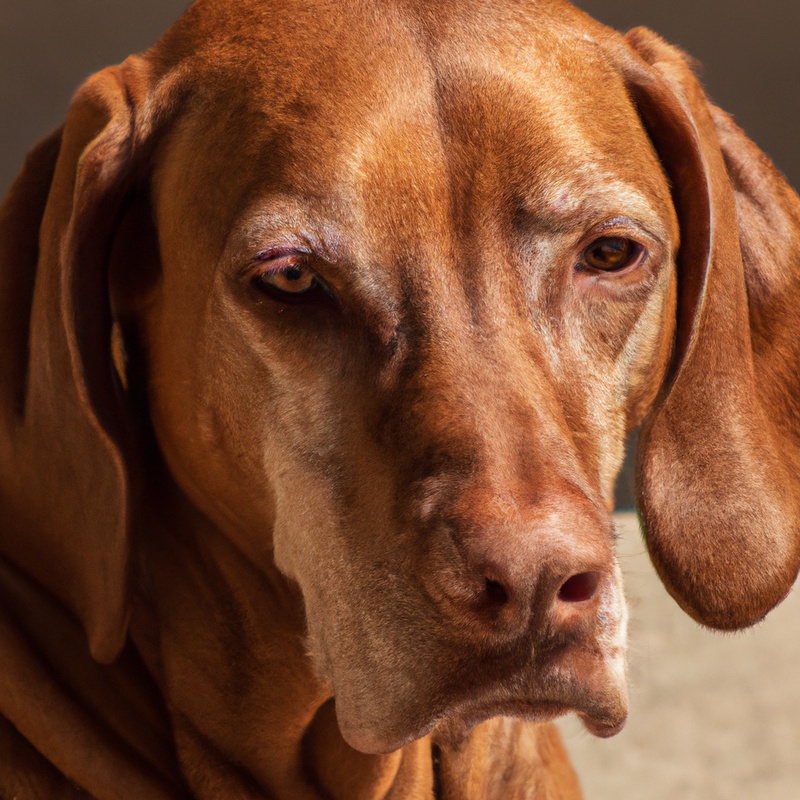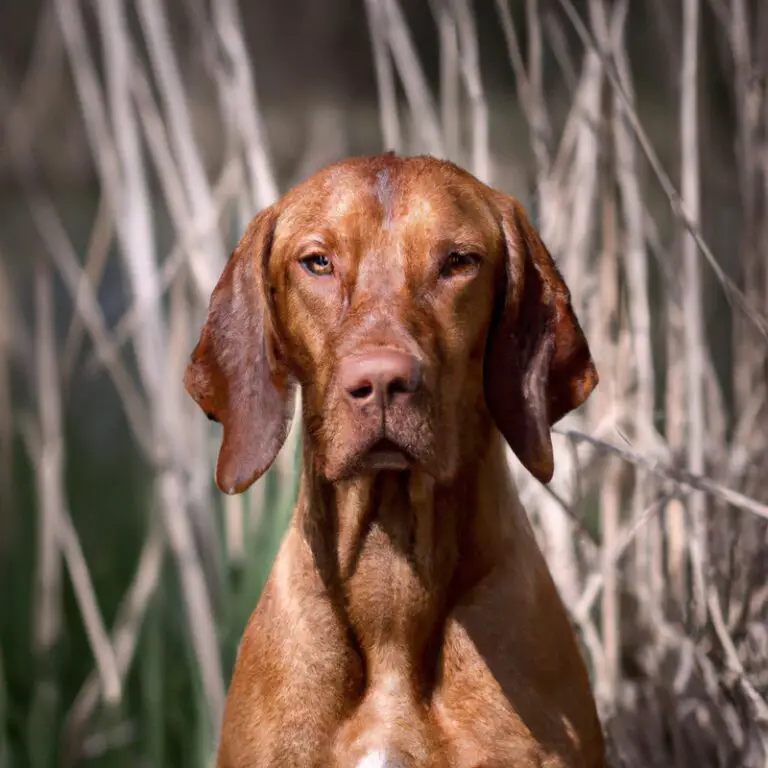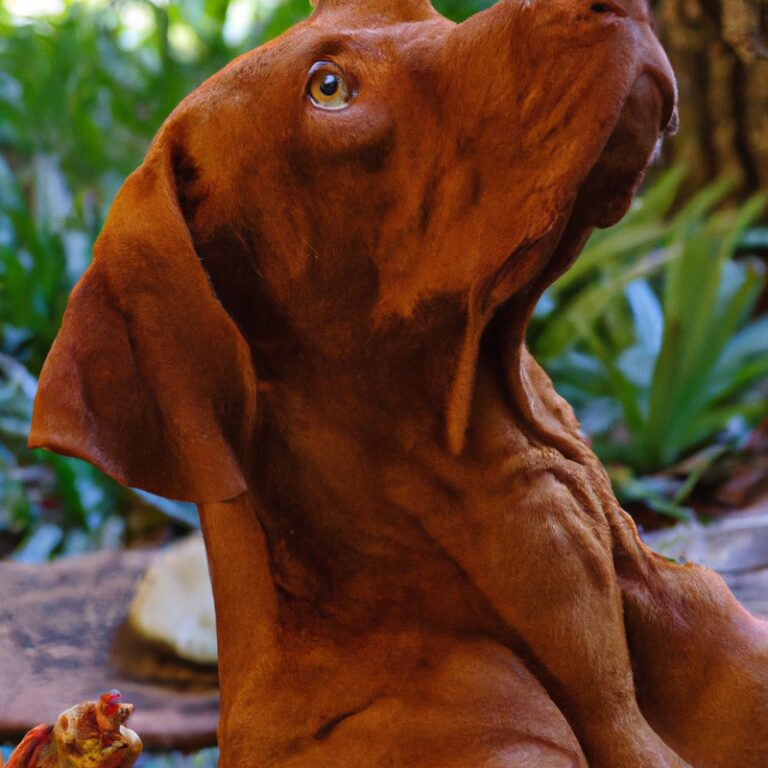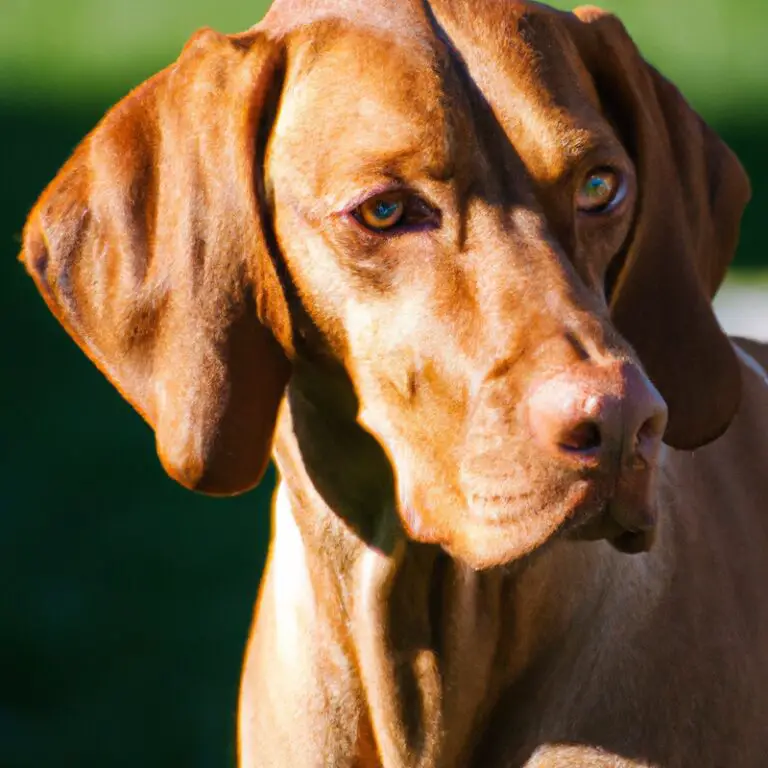What Is The Ideal Diet For a Vizsla?
Key Takeaways:
- A high-quality, balanced diet is essential for the overall health and well-being of Vizslas.
- Vizslas require a diet rich in protein to support their active lifestyle and muscle development.
- Fresh fruits and vegetables can provide important vitamins and antioxidants for Vizslas.
- Feeding Vizslas smaller, frequent meals throughout the day can help prevent digestive issues.
Are you a proud Vizsla parent looking for the best way to nourish your furry family member? Well, you’ve come to the right place! As an expert on all things Vizsla, I’m here to guide you through the ideal diet for your beloved pup.
These energetic and athletic dogs have unique nutritional requirements that must be met to keep them happy and healthy.
From understanding their metabolism to choosing the right nutrients, we’ll explore everything you need to know to give your Vizsla the perfect diet. So, let’s embark on this culinary journey together and discover the recipe for a vibrant and thriving Vizsla!
| Food Type | Benefits |
| High-quality dry kibble | – Provides essential nutrients – Supports dental health – Convenient storage and feeding |
| Raw or homemade diet | – Can be easily customized – Enhanced nutrient absorption – Potential to alleviate allergies |
| Canned wet food | – Increased hydration – Enhanced palatability – Easier consumption for seniors or dogs with dental issues |
Understanding the nutritional requirements of Vizslas
Unique dietary needs and metabolism of Vizslas
Vizslas have unique dietary needs and metabolism.
They have high energy levels and require a diet that is rich in protein to support their active lifestyle.
It’s important to feed them high-quality, easily digestible protein sources.
Vizslas are prone to certain health issues such as allergies and hip dysplasia, so it’s important to choose a diet that meets their specific nutritional requirements.
Regular exercise and portion control are also essential for maintaining their healthy weight.
Nutrients essential for Vizsla’s overall health
To ensure the overall health of your Vizsla, there are several essential nutrients you should include in their diet:
- Protein: Vizslas are active dogs and require a high-quality source of protein to support their muscle development and energy levels. Look for animal-based proteins like chicken, turkey, or fish.
- Omega-3 fatty acids: These help maintain your Vizsla’s healthy skin and coat, as well as supporting their joint health. Include sources like fish oil or flaxseed in their diet.
- Vitamins and minerals: Ensure your Vizsla gets a balanced mix of vitamins and minerals to support their immune system, bone health, and overall wellbeing. This can be achieved through a high-quality commercial dog food or by incorporating a variety of fresh fruits and vegetables into their diet.
- Water: Make sure your Vizsla has access to fresh, clean water at all times. Hydration is crucial for their overall health and helps them stay active and alert.
These nutrients are essential for your Vizsla’s overall health, so be sure to provide a balanced and nutritious diet to keep them happy and thriving.
Factors to consider when choosing a diet for a Vizsla
Age and life stage considerations
Age and life stage considerations play a significant role in determining the ideal diet for your Vizsla. Puppies require a diet rich in nutrients to support their growth and development.
Adult Vizslas have different nutritional needs, requiring a balanced diet to maintain their overall health and energy levels.
As your Vizsla ages, their dietary requirements may change, with senior dogs benefiting from a diet that supports joint health and manages weight. It’s important to consult with your veterinarian to ensure you are providing the appropriate diet for your Vizsla’s age and life stage.

Activity level and exercise requirements
The Vizsla is a highly energetic breed and requires plenty of physical activity. Daily exercise is a must to keep them happy and healthy.
Aim for at least 1-2 hours of vigorous exercise, such as running, playing fetch, or participating in dog sports.
Mental stimulation is also important, so consider adding puzzle toys or training sessions to their routine. Regular exercise will help prevent behavior problems and ensure a well-balanced Vizsla.
Health conditions or allergies
Health conditions or allergies can greatly impact a Vizsla’s dietary needs. Some common health conditions to consider include hip dysplasia, allergies, and digestive issues.
If your Vizsla has any of these conditions, it is important to consult with a veterinarian to determine the best diet.
Allergies can be caused by certain ingredients, so you may need to avoid specific foods or opt for hypoallergenic options. Additionally, Vizslas with digestive issues may benefit from a diet that is easily digestible with limited ingredients.
Regular check-ups and monitoring are essential to ensure your Vizsla stays healthy and happy.
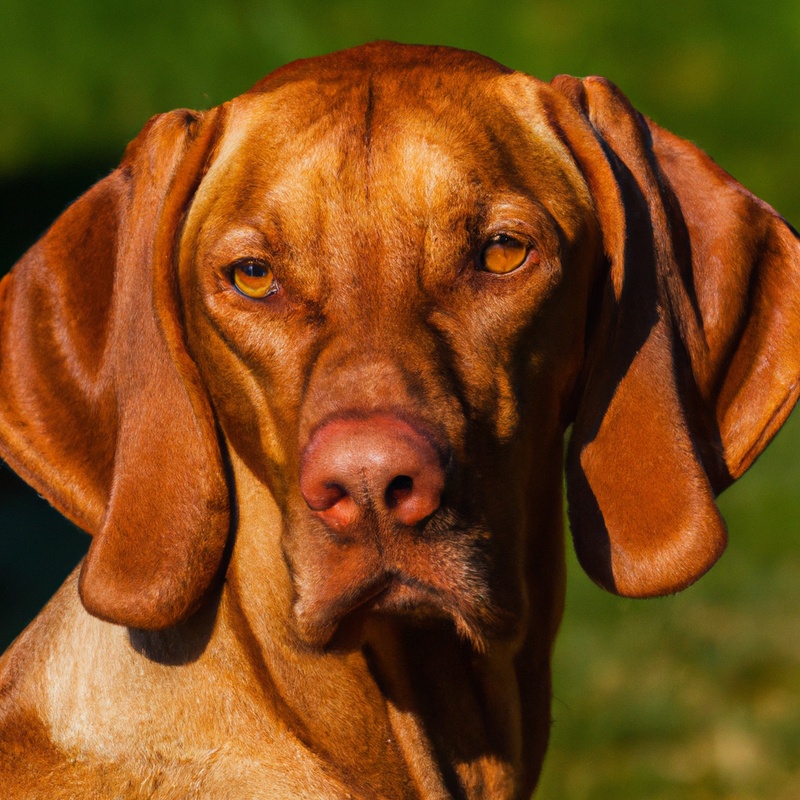
Recommended diet options for Vizslas
High-quality commercial dog food brands suitable for Vizslas
I recommend considering the following high-quality commercial dog food brands for your Vizsla:
- Orijen: Known for its biologically appropriate recipes with high-quality protein sources.
- Acana: Offers a range of grain-free options made with limited ingredients.
- Blue Buffalo: Provides a variety of formulas tailored to specific life stages and dietary needs.
- Taste of the Wild: Features grain-free options that mimic a natural diet.
Remember to consult with your veterinarian to determine the best option for your Vizsla’s specific dietary requirements.
Raw food diet for Vizslas
A raw food diet can be a good option for Vizslas. It involves feeding them raw meat, bones, fruits, and vegetables.
This diet mimics what they would eat in the wild and can provide them with essential nutrients and enzymes.
However, it’s important to consult with a veterinarian and do thorough research before making the switch. Some considerations to keep in mind include balancing the diet, avoiding certain foods, and practicing good hygiene.
Home-cooked diet options for Vizslas
When it comes to home-cooked diet options for Vizslas, there are plenty of healthy and nutritious choices you can make. Here are some ideas:
- Lean proteins: Include lean meats like chicken, turkey, or fish in your Vizsla’s diet. They provide essential amino acids for muscle health.
- Fruits and vegetables: Incorporate a variety of fruits and veggies, such as blueberries, carrots, and spinach. They offer vitamins, minerals, and fiber.
- Grains: Whole grains like brown rice or quinoa are good sources of energy. Limit grains if your Vizsla has any sensitivities.
- Healthy fats: Add a small amount of olive oil or fish oil to your dog’s diet to support their skin and coat health.
Remember to consult your veterinarian or a canine nutritionist to ensure the homemade diet meets your Vizsla’s specific nutritional needs.
Feeding guidelines for Vizslas
Appropriate portion sizes based on age, weight, and activity level
When determining appropriate portion sizes for your Vizsla, it’s important to consider their age, weight, and activity level. Puppies require smaller portions compared to adult dogs, and as they grow, the portions can be gradually increased.
Weight is a key factor, as overweight Vizslas may need smaller portions to maintain a healthy weight.
Lastly, the activity level of your Vizsla plays a role in portion sizes, with more active dogs typically needing larger portions. It’s best to consult with your veterinarian to determine the optimal portion sizes for your individual Vizsla.
Recommended frequency of feeding and mealtime routine
To keep your Vizsla healthy and satisfied, I recommend feeding them twice a day.
This helps maintain their energy throughout the day and prevents overeating.
Establish a consistent mealtime routine by feeding them at the same time every day.
Avoid free-feeding, which can lead to weight gain.
And remember to provide fresh water at all times!
Foods to avoid in a Vizsla’s diet
Harmful ingredients or additives in commercial dog food
There are some harmful ingredients and additives to be cautious about when it comes to commercial dog food. These can include:
- Artificial preservatives: Look out for BHA, BHT, and ethoxyquin, as they have been linked to potential health issues.
- Artificial colors: Ingredients like Red 40, Yellow 6, and Blue 2 are often used to enhance the appearance of the food, but they offer no nutritional value and can have adverse effects.
- By-products: These are low-quality, inexpensive meat sources that may contain organs, bones, and other undesirable parts. Opt for foods with named sources of meat instead.
- Corn, wheat, and soy: These ingredients can be hard for dogs to digest and may cause allergies or other digestive problems.
- Added sugars: Avoid foods that contain high amounts of sugar or corn syrup, as they can contribute to obesity and dental issues.
Remember, it’s important to read the labels carefully and choose dog food that is made with high-quality, easily digestible ingredients. Your veterinarian can provide further guidance on selecting the best food for your Vizsla’s specific needs.
Toxic foods that should never be given to Vizslas
As a Vizsla owner, I want to keep my furry friend safe and healthy.
That means being aware of toxic foods that should never be given to them.
Here are some foods to avoid feeding your Vizsla:
- Chocolate: Contains theobromine, which can be toxic to dogs and cause vomiting, diarrhea, and even seizures.
- Grapes and raisins: Can lead to kidney failure in dogs, so it’s best to keep them away from your Vizsla.
- Onions and garlic: These can damage a dog’s red blood cells and cause anemia, so it’s important to avoid them.
- Avocado: Contains persin, which can be toxic to dogs and cause vomiting, diarrhea, and difficulty breathing.
- Caffeine: Found in coffee, tea, and energy drinks, caffeine can be toxic to dogs and lead to restlessness, rapid breathing, and even heart palpitations.
- Alcohol: Just like it affects humans, alcohol can have serious effects on dogs, including vomiting, diarrhea, and even potential poisoning.
- Xylitol: This artificial sweetener, found in gum, candy, and some baked goods, can cause a rapid drop in a dog’s blood sugar levels and lead to liver failure.
It’s always better to be safe than sorry when it comes to your Vizsla’s diet.
By avoiding these toxic foods, you can help ensure your dog stays happy and healthy for years to come.
Implementing a new diet for a Vizsla
Transitioning from one diet to another gradually
Transitioning from one diet to another gradually is important for the health and well-being of your Vizsla.
Sudden changes in diet can upset their digestive system and lead to digestive issues.
To transition to a new diet, start by mixing a small amount of the new food with the old food and gradually increase the proportion of the new food over a period of 7-10 days.
Monitor your Vizsla’s response to the new diet during this transition period and make adjustments as needed.
Monitoring and assessing the Vizsla’s response to the new diet
To monitor and assess your Vizsla’s response to a new diet, pay close attention to their behavior, energy levels, and overall health. Observe any changes in their appetite, weight, and digestion.
Keep a journal to track any improvements or concerns.
Consult with your veterinarian regularly, as they can provide guidance and advice based on their professional expertise. Remember, every dog is unique, so it’s important to tailor the diet to your Vizsla’s specific needs.
Common dietary concerns and FAQs for Vizslas
How to make sure a Vizsla is getting all necessary nutrients?
To ensure your Vizsla is getting all the necessary nutrients, focus on feeding them a balanced and high-quality diet.
Here’s how you can do it:
- Choose a premium dog food specifically formulated for Vizslas. Look for options that list meat as the main ingredient.
- Provide a variety of proteins like chicken, lamb, and fish to meet their dietary needs.
- Include fruits and vegetables in their meals to add essential vitamins and minerals.
- Avoid overfeeding and monitor their portion sizes to maintain a healthy weight.
- Consider consulting with your veterinarian to determine if any supplements are necessary for your Vizsla’s specific needs.
- Always have fresh water available for them to stay hydrated.
Remember, a well-balanced diet along with regular vet check-ups will help ensure your Vizsla stays healthy and gets all the essential nutrients they need.
How to address weight issues in a Vizsla?
To address weight issues in a Vizsla:
- Monitor portion sizes: Ensure your Vizsla is eating the appropriate amount of food recommended for their weight and activity level.
- Choose high-quality, balanced diet: Opt for a nutrient-dense dog food that meets their nutritional needs without excessive calories.
- Regular exercise: Engage them in daily physical activity to help burn calories and maintain a healthy weight.
- Limit treats and table scraps: Watch the extra calories from treats and avoid feeding them human food, which can contribute to weight gain.
- Consult with a veterinarian: If your Vizsla is overweight or underweight, consult your vet for guidance on proper diet adjustments and any underlying health issues.
What to do if a Vizsla has allergies or sensitivities?
If your Vizsla has allergies or sensitivities, there are a few steps you can take to help manage their condition.
First, consult with your veterinarian to determine the cause of the allergies or sensitivities.
They may recommend an elimination diet to identify the specific trigger.
Once identified, you can adjust their diet to avoid the allergen or switch to a hypoallergenic dog food.
Additionally, you may need to provide supplements or medications as recommended by your vet.
Regular grooming and keeping their living environment clean can also help reduce exposure to allergens.
Finally, monitoring their symptoms and working closely with your vet will ensure your Vizsla gets the best care possible.
Final Verdict
Understanding the nutritional requirements of Vizslas is crucial in ensuring their overall health and well-being.
Factors such as age, activity level, and health conditions should be considered when choosing a diet for a Vizsla.
High-quality commercial dog food brands, raw food diet, and home-cooked options are recommended for this breed.
Feeding guidelines, portion sizes, and mealtime routines should be followed to maintain a healthy weight.
It is important to avoid harmful ingredients and toxic foods.
When implementing a new diet, a gradual transition is recommended, and monitoring the Vizsla’s response is essential.
By addressing common dietary concerns and FAQs, we can ensure that our Vizslas receive all necessary nutrients and maintain a healthy weight.
Remember, consulting a veterinarian is always advised when it comes to our pet’s diet.

